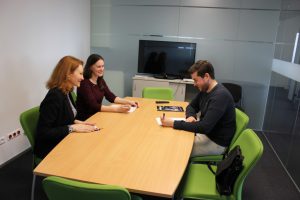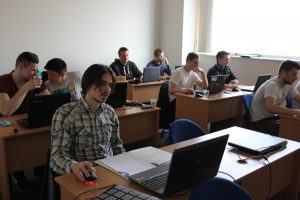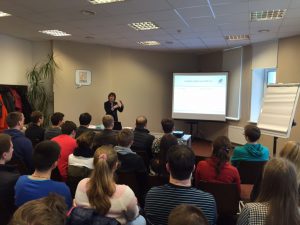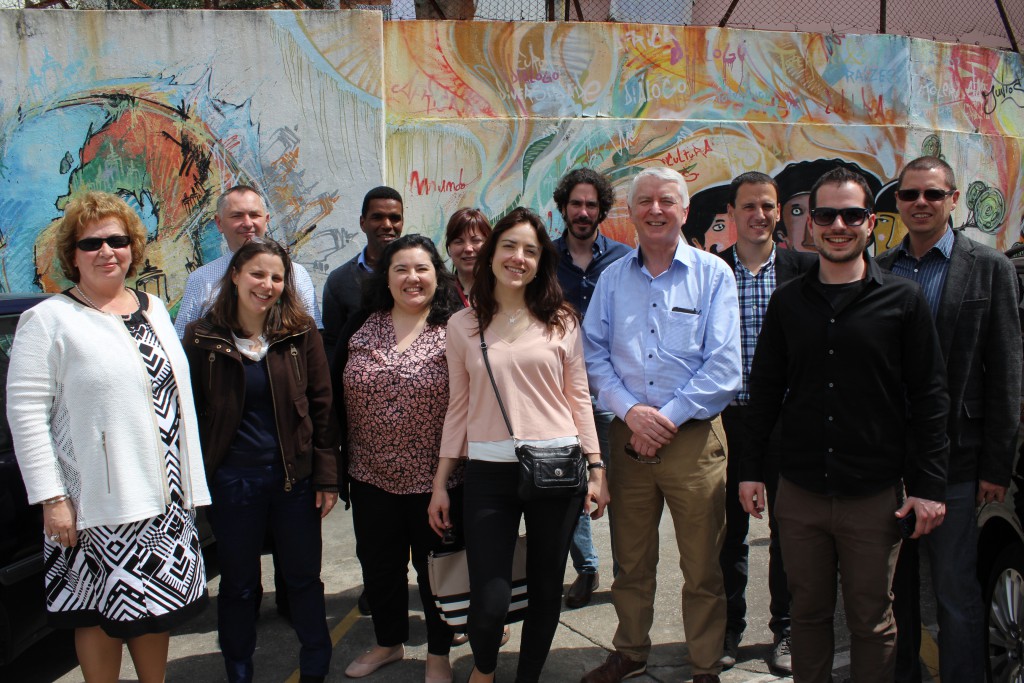19 Jun How and Why Fit4jobs Succeeds in Lithuania
19 Jun, 2015
Association Langas į ateitį is a non-profit association and the coordinator of Fit4jobs national activities in Lithuania. The project was featured in Lithuania’s biggest news portal DELFI. To find out how the project is being implemented, we talked with Rita Goberė who is the Training and Education Officer (TEO) of Fit4jobs in Lithuania.
Rita, tell us about the profile of the candidates trained within the Lithuanian Fit4jobs project.
 The first screening of the young candidates by our organisation (Langas į ateitį ) for the project revealed that 31% of a total 150 candidates knew the basics of programming and wanted to further improve their skills. 41% of them are still studying while 31% are already in employment, but looking to change jobs or careers. 34% of total 150 candidates for the Fit4jobs project were women.
The first screening of the young candidates by our organisation (Langas į ateitį ) for the project revealed that 31% of a total 150 candidates knew the basics of programming and wanted to further improve their skills. 41% of them are still studying while 31% are already in employment, but looking to change jobs or careers. 34% of total 150 candidates for the Fit4jobs project were women.
During the 2nd phase of selection interviews we saw that many young people have studied subjects not related to ICT. These young people have realised that this is a real need in the labour market. We also saw people with jobs who want to make a change in their career and shift it towards ICT.
We know that you’ve partnered with Vilnius State Unemployment Agency. What is their role in the project?
Overall, we have seen a lot of interest in the project coming from governmental institutions because Fit4jobs tackles the problem of youth unemployment directly and addresses the challenge of preparing more ICT specialists. Partnering with Vilnius State Unemployment Agency mainly helped us to shape the training curriculum of soft skills. The Youth Career Centre of the Agency also helped us define the training curriculum and spread the news to the project’s target group – young and unemployed.
In terms of employers, who has joined the project and what is their feedback so far?
A number of companies are taking part such as banks, small local IT companies, major telecommunications company (TEO), some foreign capital companies (ATEA, ASSECO, Visma Lietuva) and AB Lietuvos paštas, the largest provider of postal services in Lithuania. We looked for these companies through our networks. Even though some employers seemed to be rather careful at first, all the companies we have contacted welcomed the project idea and eventually joined it. Employers see the added value of the selection and training of people for ICT jobs being done for them, in a tailored way. They are motivated and would like to see the project continue.
What is the training about? Who is training the participants?
 We designed the training based on employers’ input and their needs for certain skills. Langas į ateitį offered three types of training: (1) basics of JAVA programming, (2) basics of WEB development, and (3) Information systems testing and analysis. Participants could choose and sign up for one of them and the majority went for the JAVA training. Courses take 90 to 100 hours to complete and consist of a theoretical and practical part, the last being an internship with an employer for around 50 hours.
We designed the training based on employers’ input and their needs for certain skills. Langas į ateitį offered three types of training: (1) basics of JAVA programming, (2) basics of WEB development, and (3) Information systems testing and analysis. Participants could choose and sign up for one of them and the majority went for the JAVA training. Courses take 90 to 100 hours to complete and consist of a theoretical and practical part, the last being an internship with an employer for around 50 hours.
Here Langas į ateitį’s role was to find those employers and then discuss and negotiate the conditions. A mentor was appointed in each company to guide selected participants in their first practical ICT tasks. As for the trainers, experienced professionals with ICT background were invited from training centres.
How do you train people in terms of soft skills?
We have organised five hands-on workshops on topics such as writing and editing a CV, preparing for a job interview, starting and planning of your career, time management and workload planning, etc. Guest speakers were invited to share their experience. For example, a director of personnel selection agency explained more about how to create a good CV and what to keep in mind when going for a job interview. A young businessman with a successful career in BARCLAYS presented his career story and motivated project participants to “dream big”.
Are you personally involved in a day-to-day training activities and keeping the contact with students?
Yes, as the Training and Education Officer, I am indeed involved in the day-to-day of the training activities. I have met in person every participant during the selection process, I know each of their stories and I stay in touch with all of them both in person and through e-mail.
How do you plan to follow up with students after the training is over?
 We plan to stay in touch with participants, mainly through email, and especially with those who didn’t get an internship at first (as not all participants will have an internship when they finish their training). In autumn we are planning to check again with employers and try to get these participants another chance to do their internships.
We plan to stay in touch with participants, mainly through email, and especially with those who didn’t get an internship at first (as not all participants will have an internship when they finish their training). In autumn we are planning to check again with employers and try to get these participants another chance to do their internships.
NGO as a matchmaker: is it something your organisation would like to do again in the future?
Absolutely! Langas į ateitį would love to do similar projects in the future. So far the feedback is very positive from employers, trainers and participants and they welcome the idea of such employment approach. I believe in the success of this project. I hope that governmental institutions responsible for youth employment, that already showed some interest in the project, will continue to support similar projects and get on board for the next round.
–
Interviewed by Ilona Griniute
Edited by Masha Tarle









